Carling Bassett-Seguso has traded tennis for pickleball - and she's never been happier
DELRAY BEACH — The first time Robert Seguso met Carling Bassett was at the 1986 French Open. He was 22 and had already won the first of four Grand Slam doubles titles. She was 18 and had turned pro three years earlier after reaching the quarterfinals of the Australian Open, then followed it up with a trip to the U.S. Open semifinals a year later.
Bassett had gone to Paris still grieving over the death of her father, Canadian business tycoon and Tampa Bay Bandits owner John Bassett Jr., after his two-year battle with brain cancer. Seguso watched in amazement as Bassett reached the fourth round at Roland Garros, going one round further than he did despite her obvious distractions back home.
“She always talked about it, her mother pushed her to go play, get out of Toronto and try to take her mind off of it,” Seguso said recently. “It was really devastating to her. She was really close to her father. It was probably a good thing (that she played). That’s when I met her. She seemed fine.”
After Bassett married Seguso the following year — when he won the French Open doubles with Swede Anders Järryd and the first of two Wimbledon titles with longtime partner Ken Flach — her new husband found out quickly that his bride was fighting demons she brought with her from a privileged childhood that wasn’t nearly as charmed as those on the outside believed.
Bassett-Seguso, now 56 and living in Delray Beach, said last week that she learned “basic survival” after moving to Bradenton and living full time at the tennis camp run by prominent coach Nick Bollettieri. His coaching style, which made tough love seem soft by comparison, helped her transition quickly from her family’s tragedy in Canada to the continuation of her fast start as a professional.
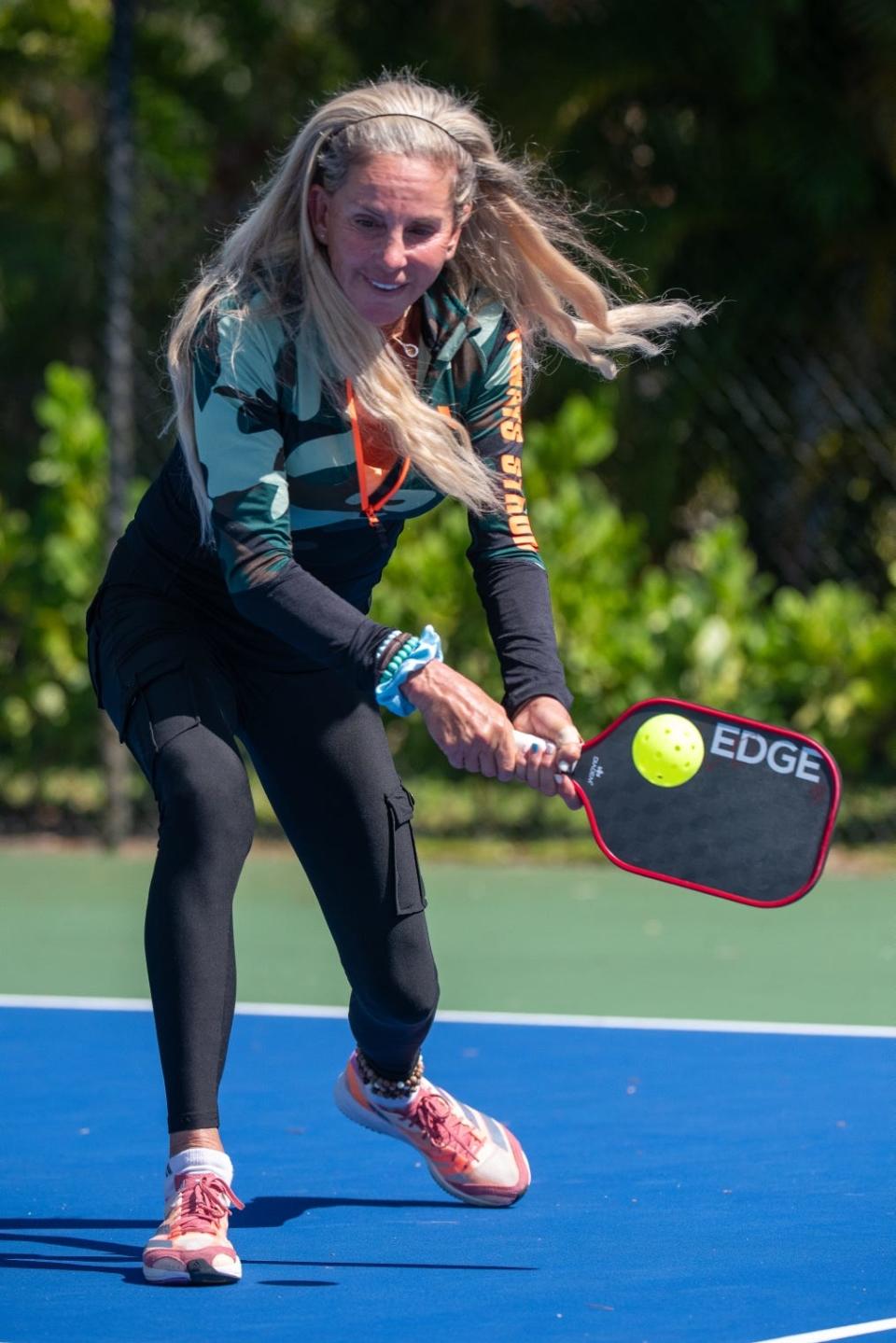
“That’s the best thing I could have done,” she said last week about her experience at that French Open. “That’s the only thing I knew how to do. It was automatic for me. Fortunately, I met Rob. I wouldn’t have met Rob if I had plopped myself back (on the Women’s Tennis Association tour) a week after (the tournament ended).”
Four-year stay at Nick Bollettieri's tennis camp takes its toll
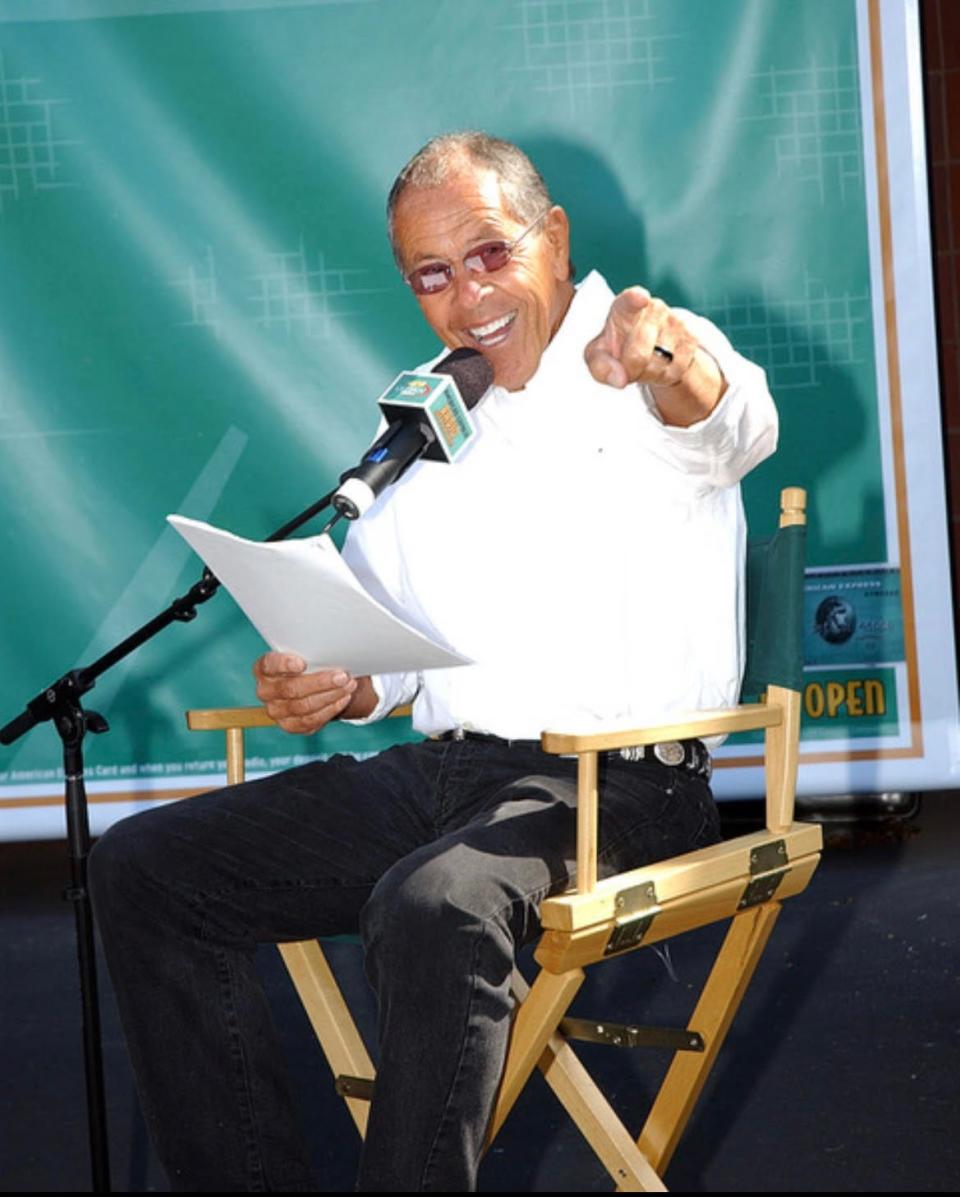
It was her four-year stay at Bollettieri's camp that helped her advance in the French Open and later caused the most damage to what had the makings of a brilliant career. Eventually, it would take its toll and be part of Bassett-Seguso’s struggle, one that endured for much of her adult life.
“I was thrown into this military guy’s house, I had just turned 11, I hated tennis and I got treated so poorly because I wasn’t the star of the house,” she recalled. “You fight for your turf, and that’s what I did … I dealt with so much in my life, I could block things out very easily, and pretend they’re not there, then I suffer horrifically.”
The struggle has quieted, if not totally ceased, over the past two years as Bassett-Seguso used an intriguing mix of plant-based medicine while diving deeply into a new sport similar to the one she had played. In time, it helped her improve the relationships she had within her own family and develop what has become a second family whose members have the same healthy athletic addiction as she now has — pickleball.
“I know this kind of sounds corny, but I’ve been through a lot in my life (and) I think the universe put pickleball here to heal the world,” Bassett-Seguso said last week, sitting under the late afternoon sun by the pickleball courts at the Delray Beach Tennis Center, close enough to where the family lives that they can walk over or drive their golf cart.
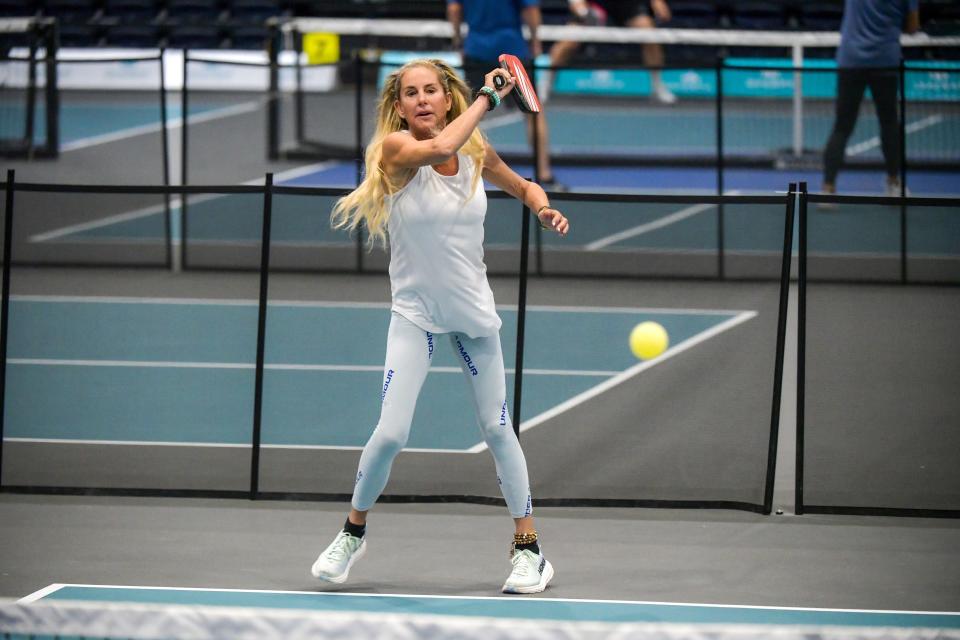
The initial grief from her father’s death triggered the suffocating depression that had haunted her family for generations. Bassett-Seguso had developed bulimia as a preteen under pressure from Bollettieri.
A career that had begun with so much promise flamed out. She would win two singles and two doubles titles on the WTA circuit, and reach No. 8 in the world in 1987.
A year later, she retired.
Bulimia, drug addiction part of the dark path Bassett-Seguso took
She kept the bulimia a secret, even from Seguso, until she went cold turkey a few years into a marriage that produced five children, with her oldest son, Holden, and her youngest daughter, Teddy, born 24 years apart. The depression remained, and for the next three decades, it got progressively worse. She became addicted to the drugs doctors prescribed for her, often polydrugging her to the point that she spent most of her time in a pharmacological fog.
“That was just a bomb ticking,” she said. “After my dad died, everything just went to crap. After Holden was born (in 1988), I started having my journey in the real world, which really wasn’t the real world. At least I stopped the whole bulimia. You just become a pro at hiding. Even people who do know it, they just don’t want to see it. I try to be open with everything. Secrets are our own worst enemy in life.”
Along the way, combining the antidepressants with a steady flow of alcohol and various forms of cannabis, it helped dull the emotional pain that lingered from what she called a “horrible sexual thing” that occurred when she was 7 years old in Canada. Initially, it led her to cutting her hair, throwing away her dresses and turning her dolls into a make-believe family.
“I turned myself into a boy, I wore a boy’s Speedos, I wanted to be ‘Tommy Terrific,’ ” she said.
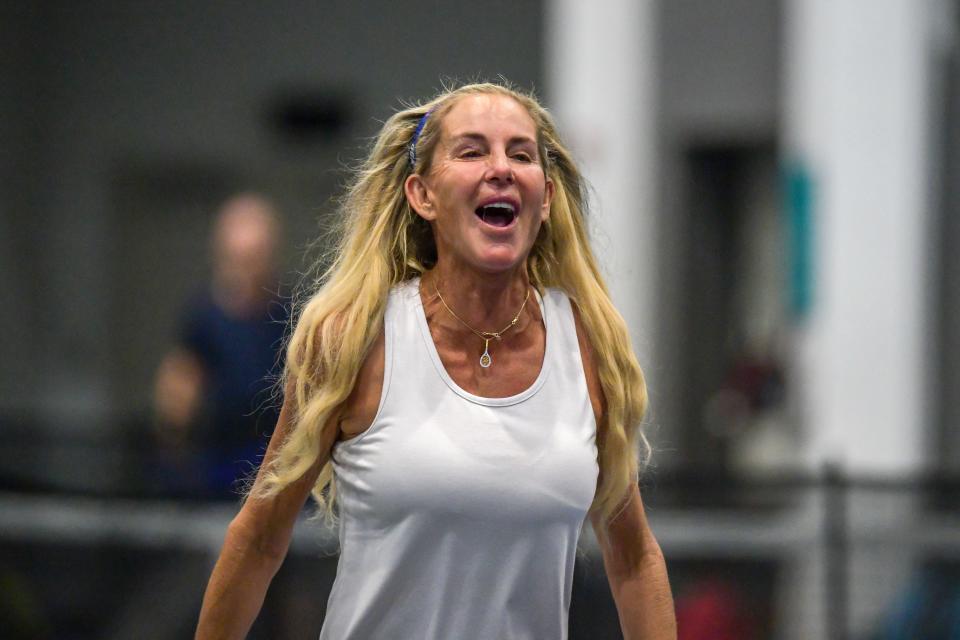
With all these afflictions conspiring, Bassett-Seguso became suicidal, and a series of unsuccessful attempts at rehab only seemed to make the maelstrom of her life even more dire.
“Most people, when they clean up, they thrive, but I (got) worse,” she said. ”Conventional medicine and therapy really didn’t fit my gig, and I fell into the worst of the worst (depression). Doctors tried everything and nothing was working. I lived in a halfway house for two months, I couldn’t touch my kids.”
The most routine chores such as food shopping became overwhelming for Bassett-Seguso.
“I couldn’t even go to the grocery store without forgetting where I was going,” she said. “I’d go up and down the aisle and the manager knew me, and he would say, ‘Carling, can I help you with your list?’ It was awful. It’s called anxiety death. I thought I had dementia.”
As difficult as it was for the couple, Seguso believes that his wife’s erratic behavior was felt more by their children, sons Holden (36) and Ridley (31) and daughters Carling Jr. (32), Lennon (13) and Teddy (12).
“They didn’t really understand, they didn’t get it,” Seguso said. “My older kids get it now. What she’s been through, they understand it now, she understands it and my younger ones understand and they can hear a lot of the stories when the other three were younger.”
It took a move four years ago from Bradenton back to South Florida, near where Seguso and his wife built a tennis academy in Boca Raton in the early 1990s, for Bassett-Seguso to begin to get healthy and to find a new purpose.
Having recovered from her bulimia — though it resulted in her being afraid to eat and appearing anorexic at times — it took many more years to get off the drugs she was prescribed. Those drugs were not only for her depression but also for the physical pain that resulted from her passion for riding horses after she had retired from tennis.
“I've broken everything in my body,” said Bassett-Seguso, adding that her more serious injuries included a broken hip, shattered pelvis and a few concussions.
Mushrooms were biggest aid to overcoming depression
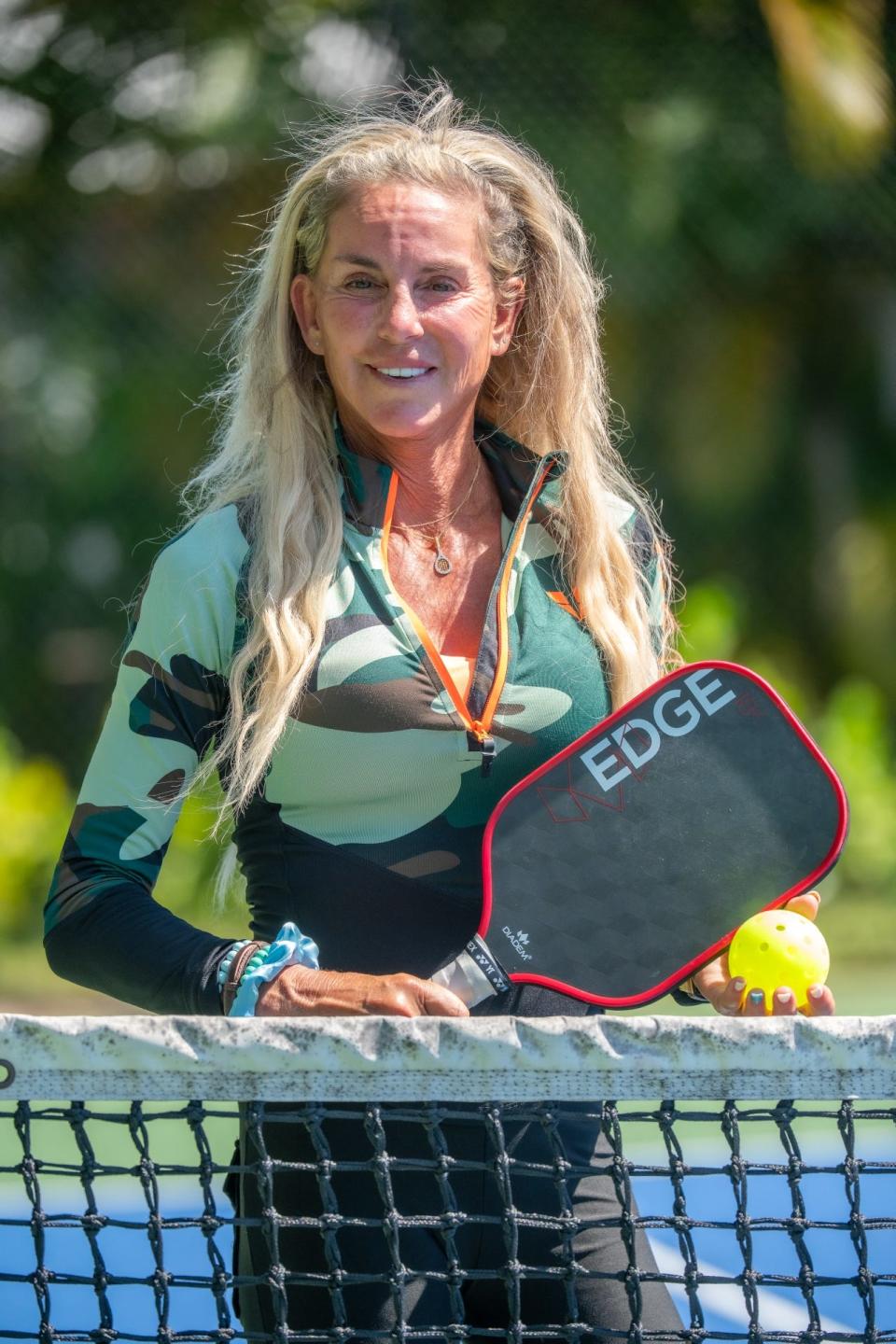
The biggest aid to overcoming her depression was using psilocybin mushrooms, a psychedelic drug that under the proper care can help those who have suicidal thoughts. A doctor who was treating her for depression had hoped to get Bassett-Seguso into a clinical study in Fort Lauderdale but then scrapped the plan for fear she would be administered a placebo.
Instead, she bought some mushrooms from an acquaintance whose mother had tried to kill herself and was healed by taking them.
“I knew the next morning after I took them, there was a glimpse of hope because I could at least get out of bed,” she said. “(Before she took them), my weight fell to 98 pounds. I couldn’t eat, I couldn’t swallow. I couldn’t even leave the house. My husband was terrified. I was needy. He couldn’t even go to a business dinner without me flipping out, my whole body shaking.”
The final piece to recovery was when Bassett-Seguso started going to the Delray Beach Tennis Center to reach back into her former life as an athlete. She also wound up finding a sport that she had tried briefly with her two youngest kids when they lived in Bradenton but, like the rest of humanity, barely paid any attention to until two years ago.
She was reintroduced to the sport by a few of her tennis-playing friends who also were experimenting with pickleball.
“People here saw me getting better (emotionally),” she recalled. “I don’t know who brought me back here (to the pickleball courts), but I started playing it. I loved it. I loved the camaraderie of the people. I’ve always been a social animal. A year and a half ago, I couldn’t even talk to people. Everything about it I love. It was fun, it was easy. All walks of life were playing it. I was meeting girlfriends that I had never had.”
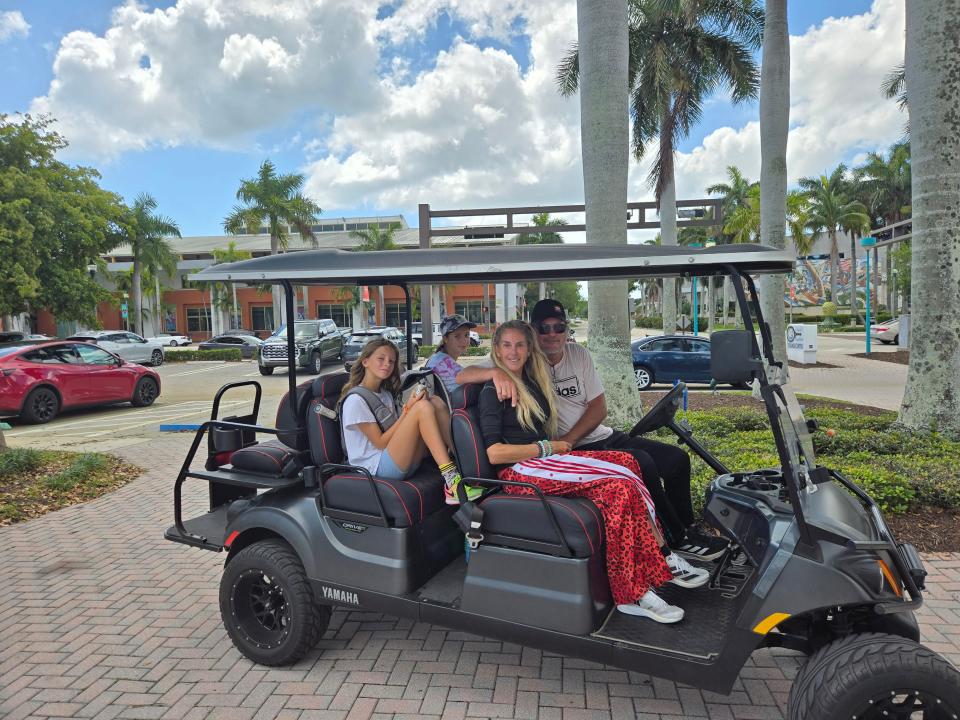
After injuring herself early on — tearing both her ACL and MCL while playing in a tournament — Bassett-Seguso is now healthy and one of the most recognizable figures in Palm Beach County's vibrant and vast pickleball community. As a result, her circle of friends has widened a hundredfold.
“I think it hits everything from A to Z, it’s not just a sport, it’s a lifestyle,” Bassett-Seguso said.
Pickleball has become obsession for the entire family
She plays up to eight hours a day at times, beginning with 6 a.m. practice sessions with Teddy at Caloosa Park in Boynton Beach before school starts. She spends the rest of the day finding games in private country clubs or playing with daughters Teddy and Lenny (Theodora and Lennon) on one of the eight dedicated courts at the back end of the downtown Delray Beach tennis facility. On rainy days, she treks with Teddy down to the new Diadem complex in Coconut Creek.
This month starts a busy stretch for Bassett-Seguso and her pickleball-playing family.
Competing in the Vlasic Classic in Delray Beach last week, Carling won a silver medal playing with fellow Torontonian Marcello Pettinella in the 50+60+ 4.5 mixed doubles. Carling Jr. also won a silver medal playing with Debbie Drum in women's doubles 19+ or 35+ 4.5.
The big winner in the Seguso family was 12-year-old Teddy, who won both women's doubles 19+ 3.0 3.5 (playing with 9-year-old Lily DeHeart) and in mixed doubles 19+ 3.0 3.5 (playing with 13-year old Jayden Tully.
Later in the month, she and Teddy will go to Naples to play in separate events in the Minto U.S. Open. And in late May, she will play in the APP New York Open at the USTA Billie Jean King National Tennis Center in Flushing Meadows, where — 40 years ago — Bassett-Seguso lost to Chris Evert in the semifinals of the U.S. Open.
Segoso is thankful for the transformation his wife was able to make.
“The last two years she’s been unbelievable, she’s a totally different person than anybody I’ve met in my life,” he said. “Once she got off all the stuff, it took her about six months, but I could see her progressing, getting better and better. She’s always happy now. She wants everybody to be happy.”
Said Bassett-Seguso: “I kind of thrived in the grind, now I’m tired of the grind. I look at anything that’s going to make my life a little difficult and I say ‘No’ to it. I never used to say ‘No’ to anything. I was a huge pleaser. I was so insecure. Now I am the most secure I’ve ever been.”
Pickleball has not only been a balm for Bassett-Seguso but for her family as well. Ridley overcame his own struggle with depression and is now playing professionally. Teddy came out of her shell and started doing better in school. Lennon, who is named for the legendary Beatle, has balanced a burgeoning soccer career with pickleball.
Even Robert Seguso, one of the best doubles players in the history of men’s tennis with 29 overall titles, is starting to play a game built more for doubles than singles. Seguso doesn’t see himself joining his wife, kids and other family members on the court for tournaments, preferring to play in less stressful settings.
Seguso said he's just happy that his wife, whom he first met nearly 38 years ago, is happy.
“It’s always been a struggle (for Bassett-Seguso) to find happiness or feeling good inside or what she feels now … It’s mind-blowing to me after all the stuff we went through … She’s in this place, but pickleball came along at the right time.”
As she did when she was on the tennis circuit, Bassett-Seguso lets everything out on the court, playing in a frenetic and fearsome pace, from friendly trash-talking with her opponents — even her own kids are not immune — to words of encouragement for them and less talented playing partners as well as self-directed expletives to get herself going.
She has turned her best shot in tennis — her two-handed backhand — into a weapon on the pickleball court.
“I always have a great time,” she said. “I play in tournaments now, which I love. If you’re going to get on me, I’m not going to play with you, because I give 150%. I train my butt off. I’m out here to have fun, compete like hell, but when it’s done, I’m leaving it as done.”
More: Coco Gauff helps unveil refurbished tennis courts at Delray Beach's Pompey Park
In one of Teddy’s recent tournament matches, Bassett-Seguso did her best to keep quiet as her daughter’s opponent, at the urging of the player’s mother, gave an incorrect score in a match that did not have an on-court referee to correct it. It eventually led to defeat. Another parent sitting next to Bassett-Seguso offered her something to calm her frayed nerves.
“He took out a vape and said, ‘You might need this,’ ” she said with a laugh. “I told him, ‘I’m good. I’ve been there and done this.’ ”
Don Markus covered sports, including professional tennis, during a 45-year newspaper career, all but 10 at The Baltimore Sun. He gave up playing tennis and full-court basketball last year for pickleball.
This article originally appeared on Palm Beach Post: Former WTA star Carling Bassett-Seguso trades tennis for pickleball

